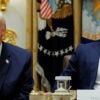Last week, the U.S.-U.K. Defense Trade Cooperation Treaty won strong public backing from two important allies: Senator Lindsey Graham (R-S.C.) and Senator Jim DeMint (R-S.C.). The Treaty, like a similar one between the U.S. and Australia, would permit the U.S. to trade most defense articles with these nations without an export license or other written authorization.
Despite some recent improvements, the export license process remains a cumbersome and lengthy one. This discourages defense suppliers from the U.K. and Australia from participating in U.S. defense acquisition programs, which raises costs and reduces the ability of the U.S. to supply its forces efficiently. At the same time, the license system raises barriers to profitable U.S. exports to its closest allies.
Recognizing that this is neither in America’s strategic nor economic interest, the Obama Administration has already put both treaties on its Treaty Priority List. The backing of Senators Graham and DeMint offers strong new hope that the Senate will act soon on both treaties, with Sen. Graham promising to make a “full court press.”
As Sen. DeMint pointed out, there do not appear to be any objections in principle to the treaties. The problem is that, as he put it, there is also no sense of urgency about them, in part because there is no obvious, immediate upside for any legislator who spends time on the issue.
Both Senators decried what Sen. Graham described as the “lack of energy” that has slowed consideration of the treaties. The basic problem is that, as Sen. Graham regretfully conceded, we tend to take our friends, like Great Britain, for granted. The willingness of both Senators to put our friends first, and to take the time necessary to make it happen, is important and praise-worthy.
Speaking at the same event, Dr. Liam Fox, the British Shadow Secretary of State for Defense, explained why the Treaties are in the interest of both nations. For the U.K., the treaties offer economies of procurement scale, i.e. the ability to buy in the larger U.S. market. For the U.S., the treaties offer the possibility of more exports, plus the more valuable benefit of cementing the U.S.-U.K. alliance and insuring interoperability with our most important ally.
More fundamentally, for the Conservative Party, Dr. Fox noted, shifting procurement from European to U.S. sources was a matter of strategic importance: more cooperation on defense procurement within the EU for Britain means a weaker Britain and a weaker NATO, because so few of the EU nations are willing to fight. The treaty will help to resist and reverse that trend, which is why it is in the British and American interest alike.





























